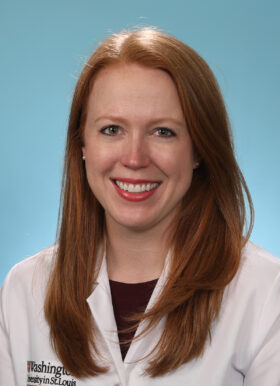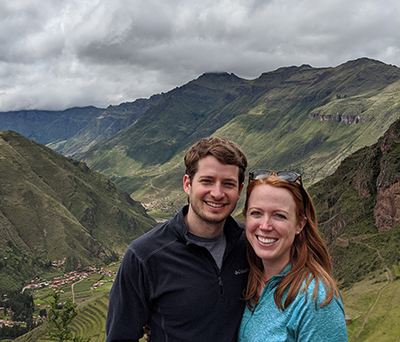Marie Batty, MD

Marie Batty, MD, specializes in pediatric primary care with Washington University Clinical Associates (WUCA).
Dr. Batty sees patients at:
Blue Fish Pediatrics
12360 Manchester Road, Suite 100
St. Louis, MO 63131
PLEASE CALL 314-966-8500 FOR AN APPOINTMENT
What happened in the course of schooling to influence you to choose your specialty?
When I was in medical school, I wanted to specialize in either pediatrics or OB/GYN, and tried to keep an open mind while I explored both options. However, I realized fairly quickly that I wasn’t surgery or procedure oriented, so that influenced my decision and made it easy to choose pediatrics.
I love the variety of pediatric patients. Obviously, seeing a baby is much different than seeing an adolescent. What is really important in pediatrics is the focus on preventative care and family counseling. I really love talking to families about how to keep kids healthy as they grow. That was really interesting to me.
I went to Saint Louis University (SLU) for medical school and a lot of my mentors at SLU were pediatricians. They seemed really fulfilled by their careers, and felt like they were making a difference. That solidified pediatrics for me in medical school. When I was in residency, I kept an open mind between general pediatrics and a pediatric subspecialty. When nothing jumped out to me, I went back to the idea of caring for a patient during the course of his or her life – or at least through childhood and adolescence. It was that longitudinal relationship that meant a lot to me.
During residency, I realized that patients and families trusted their general pediatrician most and looked to them for their care. That was what I wanted. I wanted to know my patients for the duration of their young lives – helping them through all their bumps and bruises, check-ups and health maintenance. That realization drove home that I wanted to be a general pediatrician.
I’m still in the infancy of my practice, but I know watching all my patients reach their different milestones will be extremely gratifying and exciting … from crawling to college.

At what age does your office stop seeing pediatric patients?
Each pediatric office does it a little bit differently. In our office, we usually see patients through college. We see our patients before they leave for college and make sure they are up-to-date on their vaccines. Obviously they have their university health clinic when they’re on campus, but we can provide any ongoing medications or other check-ups through the college years. We’re always available if things come up. Usually after college, when they’re around 21, they transition to an adult doctor.
What brought you to Washington University?
I moved to St. Louis when I attended Saint Louis University for my undergraduate degree, and stayed for medical school, as well. When it was time to look for pediatric residencies, I looked all over the country, but at that point, I was sold on St. Louis. Washington University has an excellent reputation and St. Louis Children’s Hospital has a great residency program – they both checked a lot of the boxes for me.
I matched here for residency, and stayed an additional year as chief resident. When I was looking for a general pediatrics job, I was extremely fortunate that Blue Fish Pediatrics wanted to expand and bring on a new pediatrician. The fact that they were a WUCA (Washington University Clinical Associates) practice, under the Washington University umbrella, was an added bonus. I was really happy to stay within the Wash U system as a general pediatrician.
Which aspect of your practice is most interesting?
I touched on the appeal of continuity with patients and families, but what is most interesting is the variety of my day. Today was a good example. I saw a new baby at the beginning of the day, and then a teenager for a check-up. Even though those are both check- ups, they are extremely different.
Then you have sick visits, but those are also wide-ranging. We’ve been seeing a lot of COVID symptoms, GI bugs and injuries from sports or activities. It is really interesting and keeps me on my toes as I have to shift gears from room to room. It makes for a fulfilling day, every day.
One day I needed to speak to a pediatric dermatologist about a concerning rash I saw on a patient. I was able to upload a picture of the rash to the patient’s chart, and call Children’s Direct to talk through the potential diagnoses and management options with a pediatric dermatologist.
Having trained at St. Louis Children’s Hospital, I know how great the pediatric specialists are there, and I refer a lot of patients to them. This relationship has been very helpful in terms of counseling my patients on what to expect when they need a subspecialist.
What new developments in your field are you most excited about?
I sound like the typical pediatrician for saying that vaccines are perpetually exciting, but it’s true. Obviously COVID vaccinations are top-of-mind. I get asked about COVID vaccines from our families because their kids are vulnerable at this point. We just got approval to vaccinate the 5- to 12-year-olds, and hopefully the younger ones next spring. The idea that we can protect them against this very omnipresent disease is wonderful.
Vaccines in general are an amazing technology, and they protect kids from illnesses we don’t really even see anymore. Pediatricians who are training now don’t see chicken pox, and that’s thanks to vaccination campaigns and rigorous research and safety data. My experience with chicken pox is pictures in my family’s photo album of me with chicken pox!
Meningococcal B vaccines and HPV vaccines are “newish” to protect against very severe disease or cancer, in the case of HPV.
Where are you from?
I grew up in Peru, Illinois, a small town about three and a half hours from St. Louis – population 10,000 people. My parents and grandparents are from the area and we all went to the same high school. I left Peru to come to St. Louis for college, loved it here and never left.
My husband is from St. Louis, so I do have my in-laws here. It’s been great. I just love how much there is to do in St. Louis. I feel so spoiled here. People who aren’t from small towns don’t really appreciate how much there is to do at your fingertips in a bigger city.
Which particular award or achievement is most gratifying?
It might be the expected answer, but becoming a doctor and getting my medical degree has been my most gratifying and biggest achievement so far.
I’m the first doctor in my family — it was a big deal for me to leave Peru and go to a four-year university. To be able to continue my education and get my medical degree was an even bigger deal for myself and my family. I’ve wanted to be a doctor since I was in high school, and wasn’t sure I could do it because I knew it was a really long journey. I decided to just take the classes and see what happens. I’m passionate about my work and really wanted to be a doctor – I discovered the journey was worth the effort.
Did you have a teacher in high school who helped you on this track?
I had a guidance counselor who encouraged me to consider four-year universities and shoot for the stars in terms of what I wanted to do with my career. I was in her office a lot — she really pushed me. My parents were always a great source of support and definitely provided endless encouragement along the way. Then, of course my husband is my cheerleader and supporter in my current job.
What is the best advice you’ve received?
The best advice I’ve received was to enjoy the journey. Someone told me this many years ago, and I try to remind myself regularly. I realize I often get caught up in the checklist life — trying to accomplish things to get to that final destination.
Specifically during medical school, residency and getting a job — I realized I didn’t appreciate the day-to-day because I was so focused on the end result. By reminding myself to enjoy the journey, I try to take in where I am at this point in my life and be grateful for the people around me.
If you weren’t a doctor, what would you like to be doing?
You probably hear this answer a lot, but I would be a teacher – either high school biology or psychology. I remember both of those classes being very formative for me in high school. They piqued my interest in medicine and psychology – I went on to become a psychology major in college.
Those are important years where you can have an impact on high school students who have a lot of life ahead of them. If I wasn’t doing what I’m doing, I would be a teacher.